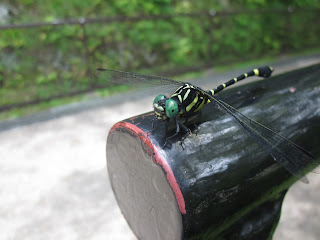"It is an experiment in treating their colour-blindness, so they will stop biting when they can see the blood and realise they are hurting people," I explained.
"One red lens and one green one," Another Kiwi vouchsafed. "Like the psychiatrist character from Twin Peaks."
"We were relaxing in the Wigglesworth Lounge at the Old Entomologist when we thought of it," I said, "kicking around a few ideas for research projects..."
"-- Also a pickled spleen which makes a serviceable substitute for a hacky-sack," AK interrupted. It turned up in one of the carboys labelled "Gin" and "Rum" and "Akvavit" but otherwise indistinguishable, which we bought cheap as office supplies from the vile Throgmorton.
"...Why should Jay and Maureen Neitz get all the headlines and acclamation for their gene therapy for colour-blindness in spiders?" I continued.
"I think you will discover," said tigris, in tones of no-encouragement, "that the Neitzes work with spider monkeys."
"That would certainly explain all that mysterious talk in their papers about colour vision and recognising ripe fruit," AK conceded.
And now commentator ITTDGY alerts us to the fact that the spiders have cured themselves of colour-blindness by evolving their own little filters, in front of one spot of the retina, made of red oil droplets. Well done Evolution! See how much you can accomplish when you sober up?
It should come as no surprise to the Riddled readership that spidras have big telephoto paparazzi lenses for their main pair of eyes. At the back of the eyes they have boomerang-shaped retinas which scan back and forth across the focal plane like misplaced windscreen wipers sweeping up the photons, tilted this way or that to pick out linear features slanted at different angles. Scientists put so much time into the study of spider optics because they hope to discover better boomerang designs. Not many people know that.
Compound eyes #1: Dragonfly, Japan
So rather than processing everything in parallel -- in the manner of insect compound eyes or the flat disk retina of vertebrates -- spiders actively explore their visual world, running invisible virtual fingers across it, searching for angles and lines that distinguish legitimate prey from another spider of the same species and the appropriate sex. No wonder they get bumfuzzled by big warm Soft Ones -- all curves, not enough lines -- and go all bitey.
Compound eyes #2
This requires big Spidrabrains given over entirely to processing the time-multiplexed stream of visual information. Cute little spiderlings can barely fit their big spidrabrain into their cephalothorax body segment so it bulges into their legs.Scientists put so much time into the study of vertebrate retinas because they hope to discover better Frisbee designs. Not many people know that.







4 comments:
Cute little spiderlings put so much time into the study of big spidrabrain placement because they hope to discover ways to carry bigger chainguns. Not many people know that.
~
itdgy: I thought that was warthog piglets?
Silly ITTDGY. Only the Spider Mastermind has a chaingun; the Arachnatrons carry plasma guns.
All curves, not enough lines... I'm simultaneously reminded of Mae West and Frank Belknap Long.
Post a Comment